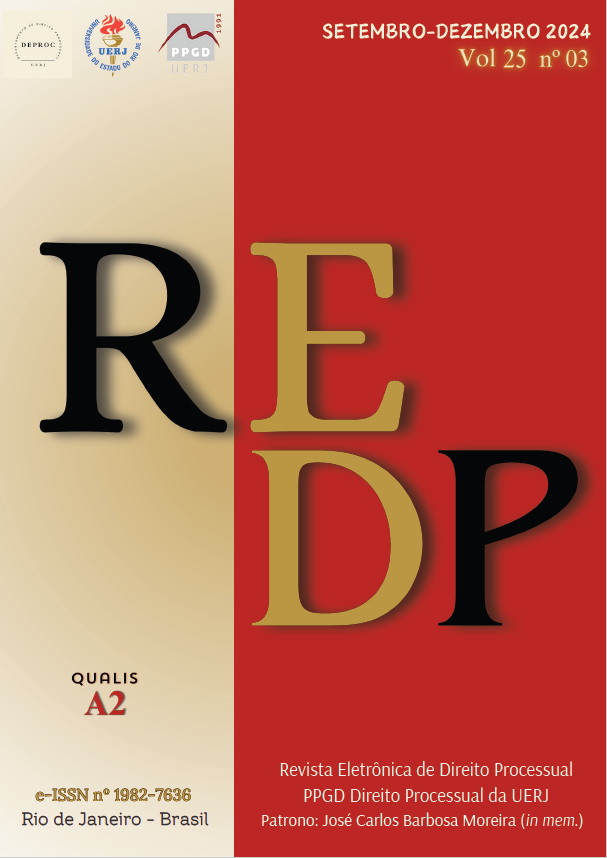A UTILIZAÇÃO DO EXAME DE DNA PARA FINS DE IDENTIFICAÇÃO CRIMINAL NOS CRIMES CONTRA A DIGNIDADE SEXUAL
DOI:
https://doi.org/10.12957/redp.2024.86605Resumo
O presente artigo visa analisar e comparar uma possível relação entre o aumento da realização de exames de DNA feitos a partir de perfis genéticos cadastrados no banco de dados nacional e o aumento da resolução de casos de processos que envolvem crimes sexuais no Brasil. A relevância do tema se dá em razão da inclusão do art. 9º-A da Lei nº 7.210/1984 (Lei de Execução Penal) pela Lei 12.654/2012, modificado posteriormente pela Lei nº 13.964/2019 (Pacote Anticrime), que atualmente determina a submissão compulsória dos indivíduos condenados, dentre vários delitos, por crime contra liberdade sexual ou por crime sexual contra vulnerável, à identificação do perfil genético mediante extração de material genético a partir do DNA coletado. Em razão da obrigatoriedade trazida pelo instituto, discute-se, tanto na doutrina quanto na jurisprudência, especialmente com o reconhecimento da repercussão geral do tema pelo Supremo Tribunal Federal no Recurso Extraordinário, de nº 973.837, a possível inconstitucionalidade do referido dispositivo, em contraponto com diversos princípios garantidos pela Constituição Brasileira e por leis e tratados internacionais ratificados pelo Brasil, em especial os princípios da presunção de inocência e do nemo tenetur se detegere. Foi realizado, ainda, um estudo comparado entre os regramentos dos bancos de armazenamento de materiais genéticos diversos em países, como Estados Unidos, Reino Unido, Alemanha e Portugal, apresentando, de um modo geral, pontos convergentes e divergentes com as disposições trazidas pela legislação pátria. A título de conclusão, são apresentadas as considerações finais sobre os resultados alcançados com a pesquisa, que demonstraram, a partir da análise de direito comparado e dos dados de pesquisas levantados no artigo, não haver nenhuma validação efetiva acerca dos impactos positivos da utilização do banco de perfis genéticos para a redução da criminalidade nos países onde a identificação criminal, alcançada pelo uso do banco de dados, é uma realidade na investigação forense.
Downloads
Publicado
Como Citar
Edição
Seção
Licença
Copyright (c) 2024 Ellen Cristina Carmo Rodrigues Brandão, Victória Fortunato Ferreira

Este trabalho está licenciado sob uma licença Creative Commons Attribution 4.0 International License.
Todos os artigos publicados na Revista Eletrônica de Direito Processual (REDP) (Departamento de Direito Processual, Universidade do Estado do Rio de Janeiro, Brasil) são licenciados por meio de uma Licença Creative Commons - Atribuição 4.0 Internacional (CC BY 4.0).
Os autores retêm os direitos autorais de seu artigo e concordam em licenciar seu trabalho com a licença CC BY 4.0, aceitando assim os termos e condições específicos desta licença disponíveis no seguinte website: https://creativecommons.org/licenses/by/4.0/legalcode.
- Os autores concedem à REDP o direito de primeira publicação, de se identificar como publicadora original do trabalho e concedem à revista uma licença de direitos não exclusivos para utilizar o trabalho das seguintes formas: Reproduzir, vender e distribuir cópias eletrônicas ou impressas do manuscrito como um todo, de partes específicas do manuscrito e de suas traduções para qualquer idioma;
- O uso do artigo por terceiros é livre, contanto que a integridade da publicação seja mantida e seus autores originais, periódico de primeira publicação e detalhes de citação sejam identificados.
Dentro dos termos da licença, os autores podem entrar em acordos contratuais adicionais separados para a distribuição não exclusiva da versão publicada do trabalho na revista.
Copyright and Licensing
All articles published in the Procedural Law Electronic Review (REDP) (Department of Procedural Law, State University of Rio de Janeiro, Brazil) are licensed under a Creative Commons License - Attribution 4.0 International (CC BY 4.0).
- Authors retain copyright to their article and agree to license their work under the CC BY 4.0 license, thereby accepting the specific terms and conditions of this license available at the following website: https://creativecommons.org/licenses/by/4.0/ legal code.
- Authors grant REDP the right of first publication, to identify itself as the original publisher of the work, and grant the journal a non-exclusive license to use the work in the following ways: Reproduce, sell and distribute electronic or printed copies of the manuscript as a whole, of specific parts of the manuscript and its translations into any language;
- Use of the article by third parties is free, as long as the integrity of the publication is maintained and its original authors, first publication journal, and citation details are identified.
Within the terms of the license, authors may enter into separate additional contractual agreements for the non-exclusive distribution of the published version of the work in the journal.




